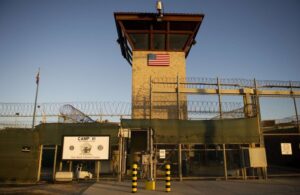
The National Interest Foundation Newsletter
Issue 85, February 26, 2021
Welcome to our NIF Newsletter. This week, we recap Thursday’s NIF Zoom event regarding the latest developments with the Libyan transitional government and the country’s prospects as it prepares for national elections at the end of this year in December. Meanwhile, in our news headlines: Chinese officials signal an intent to reform election laws in Hong Kong to favor pro-Beijing loyalists and United Nations human rights experts call on the United States to address violations at Guantanamo Bay in the aftermath of the Biden administration launching a formal review of the prison.
NIF Event
This week, the National Interest Foundation held a virtual event discussing Libya’s transitional government and the country’s prospects in the lead-up to elections scheduled for December. Our Zoom event featured experts on Libya, including Federica Saini Fasanotti from the Brookings Institution, Dr. Esam Omeish of the Libyan American Alliance, and Dr. William Lawrence of American University. Moderating the panel was Doug Bandow of the Cato Institute. The panelists discussed a wide range of issues, including the influence of outside actors in the Libyan conflict, what role the United States and international community can play, and the destabilizing actions of renegade military commander Khalifa Haftar, among other topics.
The first panelist to speak was Federica Saini Fasanotti, who joined us from Italy. She spoke on the ongoing security concerns in Libya, and the impact that Khalifa Haftar continues to have on the situation there. She argued that the conditions on the ground in Libya could easily lead to another conflict, and used the examples of high youth unemployment, poor infrastructure for civil services, and the mass proliferation of weapons throughout the country. To this end, she warned that Khalifa Haftar militarized tensions that arose from issues such as these when he began the conflict, and he could do so again to put pressure on the transitional government. To combat this, Ms. Fasanotti argued that the transitional government and international community needed to hold Haftar accountable for his previous transgressions, while minimizing the role he played in a legitimate Libyan government. To conclude, she said the US could play a vital role in balancing the interests of outside actors in Libya to bring about an end to the fighting. This strategy should be one that spans multiple presidential administrations and is not one that is motivated by electoral concerns.
The next speaker was Dr. Esam Omeish of the Libyan American Alliance. Dr. Omeish spoke on the issues that drove Libya into civil war in the first place, as well as outlining the challenges for Libya’s transitional government. He argued that Khalifa Haftar was the catalyst for the outbreak of fighting in Libya, and that he militarized political conflict. From this point, foreign proxies got involved, all of whom had competing interests, and none of which had the best interests of Libyans in mind. Now, as a result of outside actors destabilizing the country, the transitional government in Libya has a monumental task to unite the nation. The lack of infrastructure, civil services, and domestic political consensus only add to the problems the transitional government is facing.
The final speaker was Dr. William Lawrence of American University. Dr. Lawrence spoke on the transitional government establishing legitimacy in the eyes of Libyans, and what could potentially bring it down. According to him, the first priority had to be rooting out the corruption as it pertains to Libya’s natural resources. He outlined a large spoils system comprised of domestic and international actors that were robbing Libya of its resources. He argued that if the transitional government could clamp down on corruption, Libyans would see it as legitimate and malevolent actors such as Khalifa Haftar wouldn’t generate support for further conflict. To this point, Dr. Lawrence views Haftar as the greatest threat to lasting peace in Libya, saying that Haftar would likely try to militarize political tensions just as he did in 2014 if the government wavered.
To watch the entire event, including the moderated discussion following the panelists’ opening remarks, please click here.
News Headlines
Electoral Reform in Hong Kong

Analysts argue that the reform would be clearly aimed at suppressing pro-democracy forces in Hong Kong. (Photo from The New York Times)
Chinese Officials Signal an Intent to Reform Election Laws in Hong Kong to Favor Pro-Beijing Loyalists
China plans to impose restrictions on Hong Kong’s electoral system to root out candidates the Chinese Communist Party (CCP) deems disloyal, a move that could block democracy advocates in the special administrative region from running for elected office. The CCP already wields outsized influence over Hong Kong’s political landscape, and the change could potentially pave the way for the mass disqualification of pro-democracy politicians who took almost 90% of 452 district council seats during the 2019 elections. A suggested bill on the issue would require community level district councils to pledge an oath of allegiance to the city’s mini-constitution, and analysts argue that the measure is clearly aimed at suppressing pro-democracy forces there. Hong Kong’s Legislative Council is slated to debate the bill in mid-March, with China’s parliament expected to convene early next month to impose the series of electoral changes in an effort to strengthen its authoritarian grip on the city.
Human Rights Concerns at Guantanamo Bay

The new Biden administration is revisiting the idea of closing the facility. (Photo from Getty Images)
U.N. Human Rights Experts Call on the United States to Address Violations at Guantanamo Bay
A panel of United Nations human rights experts has called on the United States to address the ongoing treatment of detainees at Guantanamo Bay prison. The declaration from the U.N. comes in the aftermath of the Biden administration commissioning a study on the potential closure of the infamous facility. Human rights advocates have criticized the United States’ operation of Guantanamo Bay for years, accusing the government of violations and improprieties. Reports of torture and other ill-treatment at Guantanamo Bay have plagued the credibility of the United States in its appeals for other nations to respect the rights of detainees. A total of 40 people remain incarcerated at Guantanamo Bay, and the United Nations has expressed that the U.S. should repatriate these individuals and close the facility entirely – a sentiment also echoed by the new Biden administration in recent weeks.
Enter the text or HTML code here
